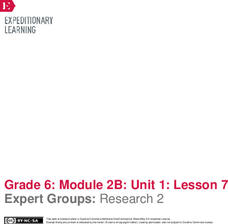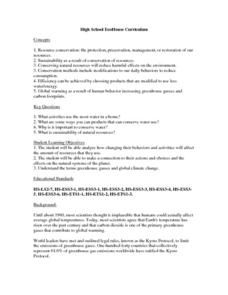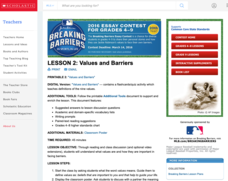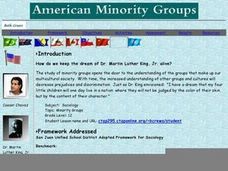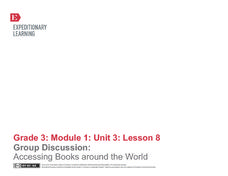EngageNY
Building Background Knowledge: Small-Group Work to Learn More about the History of Wars in Vietnam
Scholars take a close look at "The Vietnam Wars." They answer questions and discuss in groups to conclude that the author respects the Vietnamese. They participate in a modified jigsaw discussion and end the exercise with a quick writing...
Philadelphia Museum of Art
Physics at the Art Museum: Kinetic Energy, Potential Energy, and Work
Connect science, math, and art for a true interdisciplinary lesson! Learners explore simple machines in art. Through analysis with a physics app, they identify positions of kinetic and potential energy and make conclusions about work.
State Bar of Texas
Roe v. Wade
At what point does the right of privacy end and the government begin? Scholars research rights under the Ninth Amendment to the Constitution. Using the 1973 Roe v. Wade Supreme Court case as a starting point, along with small group work...
EngageNY
Expert Groups: Research 2
Continue on. Scholars continue the research they began in their expert groups in lesson six. They read text and task cards from their research folders and share what they have gathered in research thus far. Individuals then spend the...
Curated OER
Using Random Sampling to Draw Inferences
Emerging statisticians develop the ability to make inferences from sample data while also working on proportional relationships in general. Here, young learners examine samples for bias, and then use random samples to make inferences...
Caucus 101
Linkage Institutions: Interest Groups: Option A
How are elections really run and won? Learn about special interest groups, super PACs, and lobbyists with an engaging lesson about the caucus process. Young voters research specific interest groups and analyze their part in previous and...
Virginia Department of Education
Work and Power
Assist your class with correctly calculating the values for force, work, and power as they determine the amount various activities require. They gather data and participate in a group discussion to compare results upon conclusion of the...
National Endowment for the Humanities
The Metamorphoses and Later Works of Art: A Comparison of Mythic Imagery
In a lesson on The Metamorphoses, scholars compare how graphic artists use mythic imagery to represent Ovid's tales. Each group selects a work of art paired with Ovid's version of a myth and compares how both present the story.
Smithsonian Institution
Two Perspectives on the Battle of Little Bighorn/Greasy Grass
Learners understand why historians conduct research and the importance of perception when it comes to studying history. The resource covers The Wars of Expansion and the Battle of Little Bighorn/Greasy Grass through group work, debate,...
US Institute of Peace
Organizations Working for Peace
From helping refugees to negotiating peace treaties, the peacekeepers of the world keep busy! Introduce young activists to the many individuals and organizations throughout the world that work daily toward peace. 14th in a series of 15...
Baylor College
What's That Food?
Get things cooking with the first instructional activity in this series on the science of food. Working in small groups, young scientists make and record observations about different mystery foods. These descriptions are then shared with...
Curated OER
The Metamorphosis: List-Group-Label Strategy
Franz Kafka's The Metamorphosis is one of the most prominent and influential books to come out of the existential movement. Host a group discussion in which learners list different characteristics of existent art, group these tenets, and...
EngageNY
Introducing Working Conditions in the Mills
Scholars discover how working in a textile mill in the nineteenth century affected the title character from Katherine Paterson's novel, Lyddie. Partners analyze quotes from the novel and then add evidence and questions about working...
Curated OER
High School EcoHouse Curriculum
How has the level of carbon dioxide changed over recent years, and what is contributing it? Groups work together to research and present their findings in a creative way. Also built into the lesson is a visit to a sustainable house, but...
Curated OER
Cooperative Group Spelling Game
Partners or groups work together to practice the correct spelling of words. They speed-cut letters from print sources and arrange them into correctly spelled words from their lists. Newspapers are suggested, but magazines might result in...
EngageNY
Expert Groups: Research 1
Be a team player. Scholars gather in their expert groups and discuss group norms and roles. They look at their research topics and determine how they will divide the work among themselves. Groups look over their research folders and ask...
WindWise Education
How Does a Generator Work?
I get a charge out of this. In order to learn how a generator works, groups build and test one in this ninth lesson of the series. The generators are tested at low speed and high speed to determine the watt output and whether they have...
Curated OER
What is Small Group Interaction?
While all learners need to know the benefits and responsibilities of working in a small group, this presentation and its vocabulary are geared toward a late high school or early college student. Why do we study in small groups? Why do...
Curated OER
Great Expectations: Group Writing
Examine the differences between totalitarianism and democracy in this writing lesson plan. Using the same format and theme from Great Expectations, young writers work in pairs to compose their own short stories. They follow guidelines...
Dream of a Nation
Group Presentation Assignment
Rather than waiting for the world to change, encourage your class members to become agents of change with a project that asks groups to select an issue found in Tyson Miller's Dream of a Nation: Inspiring Ideas for a Better America....
Scholastic
Lesson 2: Values and Barriers
Scholars investigate and discuss the importance of values and how they can be used to break barriers. Small groups work collaboratively to examine the text and draw inferences to answer questions. A writing assignment challenges pupils...
Curated OER
American Minority Groups
Explore the contributions individuals have made in the lives of American minority groups. Twelfth graders write a five-page expository piece providing a social history, examples of discrimination, and patterns of assimilation for an...
Curated OER
The assassination of the Archduke: Exploring Perspectives
Use political cartoons for a multiple-perspectives strategy, as pupils learn about the assassination of Archduke Franz Ferdinand. After an anticipatory discussion, they are split into 2 groups. The class reads a primary source account...
EngageNY
Group Discussion: Accessing Books Around the World
Continue work with an informational text by following the procedures detailed here. The plan, part of a series, focuses on My Librarian is a Camel. Class members complete text-dependent questions and then prepare for and participate in a...
Other popular searches
- Cooperative Group Work
- Small Group Work
- Modeling Group Work
- Group Work Maths
- Group Work Rubric
- Group Work Lesson Plans
- Group Work Language Arts
- Group Work Dna
- Group Work Poverty
- Grading Group Work
- Group Work Peer Evaluation
- Cooperative Group Work Math





